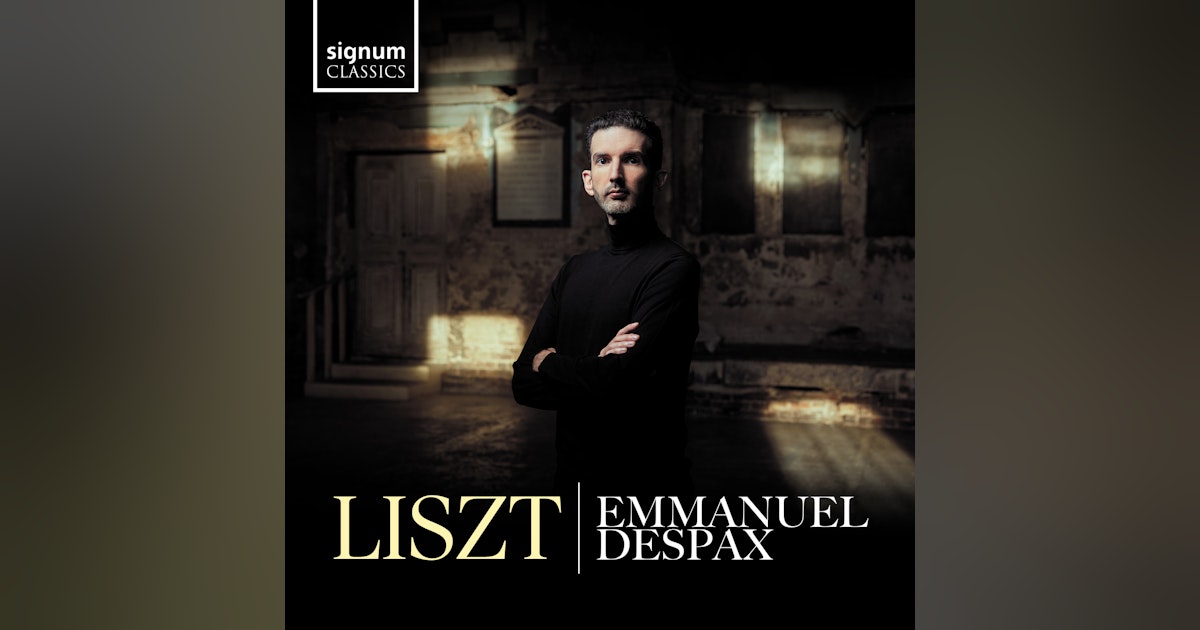
Affectionately dedicated to his friend and mentor Ruth Nye, this brilliant, significant release from Emmanuel Despax reveals performances of the highest integrity. As Despax himself puts it:
I never perceived Liszt’s compositions as mere showmanship; instead, I was captivated by its scope and artistry. He also foresaw want stylistic shifts of the 20th century, from Impressionsm to pushing the boundaries of tonality, with “Nuages gris” (featured here) standing as a remarkable example.
One of the most technically challenging pieces of Liszt’s output is the so-called “Dante Sonata”. It is racially from the second book of the Years of Travel (Années de pélèrinage). The repertoire here stalks its way between Heaven and Hell; and the journey begins in Hades with “Après one lecture du Dante: Fantasia quasi Sonata” (to give the piece its full tite: After a reading of Dane: Fantasia quasi Sonata). Despax’s reading has it all, full of passion and yet wonderful in its detail:
You can hear the bass tremolo ringing at the end, such is the power of Despax’s close; a close that comes about after a much nuanced voyage.
Despax’s way complements the alternative route of Lazar Berman, another great Lisztian, a pianist fo transcendental technique, in his case firmly in the Russian tradition:
That nuance certainly coms out in teh balancing work, the “Bénédiction de Dieu dans la solitude” (again from a larger work, this time Harmonies poétiques et religieuses, S 173). Despax’s performance of the “Bénédiction” has a sort of exalted nobility that reminds me of the great Claudio Arrau’s performance: no great surprise, possubly, as Despax’s teacher Ruth Nye was herself a pupil of Arrau.
Despax has an elegiac slant to his reading of the “Bénédiction” that is perfect. He plays with real spirit, indeed nobility while tracking the music’s discourse perfectly: it is as if there are waves of sound, cumulative in impact, until the climax. And how beautiful the lyrical balm thereafter:
To round off the first disc, another piece from S 173, “Funérailles”. The piece was composed in memory of the composer’s friends killed in the Hungarian uprising of 1849, and also Chopin (who died that very year). It is understandably dark; what it requires for a successful performance is rock-steady rhythm. There can be no hint of using; th funerary tread must prevail. As indeed it does here Note, also Despax’s superb right-hand octave legato. The line positively sings; at there times, the music is relentless (list to the left-hand octaves, the Chopin A flat Polonaise gone crazy):
The second disc couples the short but potent late piece Nuages gris with the great B-Minor Piano Sonata. There is precedent for this: the much-missed Maurizio Pollini used to present a sequence of late Liszt works (often including Nuages gris) before embarking on The Great Journey. Despite the low catalogue number (S 199), the piece was written in 1881, and its penchant for octaves links nicely to the opening often B-MinorSonata. More importantly, hearing such a stark, uncompromising, modern work prior to the Sonata shapes our experience of the larger work, allowing us to hear its combination of youthful virtuosity with a far greater musical maturity:
Despax is able to bring lyricism to his performance without losing the dramatic thread. Here the musical intelligence of Alfred Brendel meets a performance with the insight of Pollini. Im a sense, Despax’s B-Minor Sonata not only holds pre-echoes of Nuages gris but also I impacted by every other piece on the programme, from the diablerie of the Dante Sonata to the holiness of the “Bénédiction” to the depths of“Funérailles”. The third track on the Signum disc (Alllegro energico) seems to contain it all:
This performance (and the release as a whole) is a great achievement, and good that Signum has provided a couple of fly-on-the-wall videos around the recording of the Sonata:
Despax’s finest release so far. And that’s saying something! Previously on Classical Explorer we have covered Après une rêve, Spira Spera (Bach transcriptions), Brahms’ First Piano Concerto (plus some Waltzes), chamber versions of Chopin Piano Concertos and even Despax’s own The Sound of Music Fantasy. This Liszt one, though, should be an urgent purchase.
This superb release is available via Amazon at this link. Streaming links below.












